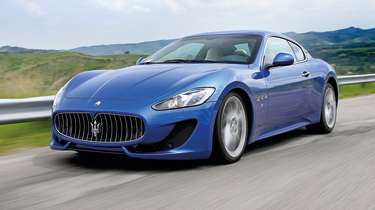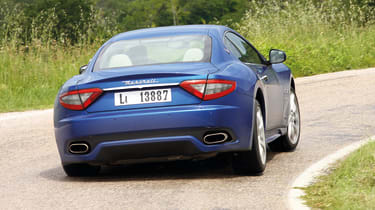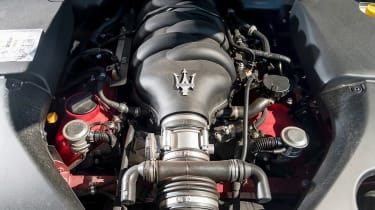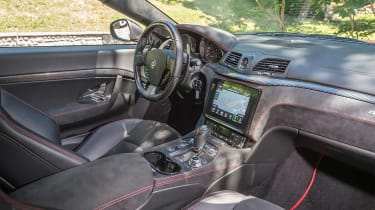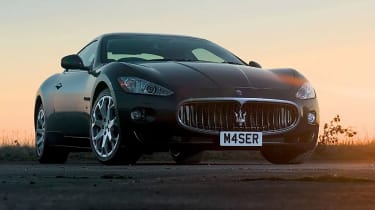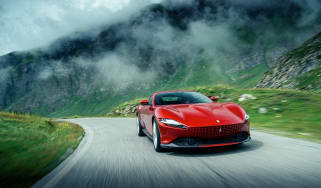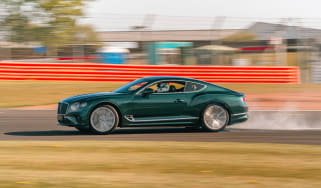Maserati GranTurismo (2007 - 2019): a handsome Italian GT with a Ferrari heart
The original GranTurismo is one of the most desirable Maseratis ever – and one of the most reliable, too. We tell you how to find one of the best
A Kia Stinger GTS could out-sprint it today, but Maserati’s GranTurismo was never quite as accelerative as its gorgeous Pininfarina looks might have led you to believe. However, in an age where electric crossovers can walk away from our favourite supercars off the line, that lack of outright firepower seems to matter less than ever.
The GranTurismo evolved significantly throughout its 12-year lifespan, first with the introduction of the S version and its uprated 4.7-litre V8 (up from 4.2 litres), then the more hardcore MC Stradale before the GranTurismo Sport arrived in 2012. A comprehensive facelift came in 2018, but for the best balance of value and performance, the 454bhp Sport presents the most appealing used buy. You can pick up a decent example for £30,000, or about the same as a well-specced new Volkswagen Golf.
> 720bhp Maserati MCXtrema makes track debut ahead of first deliveries
You don’t immediately detect the Ferrari origins of the GranTurismo’s V8, primarily because its cross-plane-crank arrangement gives it a meatier, more gravelly tone than what we’re used to from Maranello’s flat-plane-crank versions. It quickly becomes apparent that the Maserati needs some revs to come alive, and while this might feel alien if you’re used to modern torque-rich turbo engines, the rewards are worthwhile.
Pressing the Sport button on the dash releases extra volume from the exhaust and one of the best engine notes of any modern car, reaching a magnificent, baritone crescendo at 7500rpm. To unlock the Maserati’s full potential as a GT, it’s best to opt for the standard six-speed ZF torque-converter gearbox rather than the optional MC Shift version, which uses a lumpier robotised manual and firmer suspension to echo the full-fat MC Stradale. The punchy shifts of the optional ’box are an acquired taste, and the ZF, if slower, is more seamless day-to-day.
Contrary to what its name might suggest, the GranTurismo Sport’s 1880kg bulk doesn’t evaporate on a testing road, and you’re always conscious of the width of those shapely hips. However, its switchable Skyhook dampers are very nicely judged for pliancy and control, with feedback and texture permeating through the steering wheel as the speed and loads build. On more open, flowing A-roads it’s a joy to bat away at the paddles and indulge in that engine, and the chassis stays right with you.
With its largely bulletproof V8 and well-proven six-speed ZF transmission, the GranTurismo has a strong reliability record, despite what you might expect from a ten-year-old car from a specialist brand. Be warned, though, as early examples are now so accessible that some owners tend to cut corners on maintenance. Engine oil leaks are not uncommon, but these can usually be attributed to perished valve-cover gaskets rather than anything more serious. Some electrical snags – including flickering rear brake lights and malfunctioning rain sensors for the automatic wipers – can sometimes be rectified by reflashing the ECU, and early cars tend to suffer from worn interior switchgear and peeling leather. The GranTurismo’s standard infotainment system is archaic and lacking in features (some cars didn’t even have Bluetooth), but Apple CarPlay is available via an aftermarket installation, bringing some modernity to an otherwise appealingly analogue – and affordable – V8 grand tourer.
Buying checkpoints
The original Maserati GranTurismo has proved to be a surprisingly reliable car, with the vast majority of examples requiring only regular maintenance and the replacement of the usual consumables on a car of its age.
Engine
The V8 in the GranTurismo is fundamentally the same unit as found in the 4200 and the Quattroporte, and, like them, it can develop oil leaks. Upper and lower front covers can fail with time, and some early cars were delivered with faulty camshaft variators, but ensure all recalls have been carried out and you’re unlikely to have any major engine issues.
Transmission
The ZF automatic transmission is virtually bulletproof. Cars equipped with the Cambiocorsa gearbox tend to use clutches sooner than you’d expect with a traditional manual transmission, though, purely due to the increase in the number of shifts over a traditional manual.
Wheels and brakes
Weighing almost two tons, the GranTurismo is heavy on brakes. When viewing a car, run your finger over the disc to the outside edge to check for a lip in order to judge wear. Weight and driving style also means the GranTurismo tends to eat through tyres quickly, with tracking also easily knocked out by potholes. Rusty wheel bolts are also an issue many have seen, but these are easily replaceable for not much money.
Bodywork
The build quality from the factory is very good, so check carefully for any uneven panel gaps or colour differentiation, which could indicate the car has been damaged and repaired in the past.
Interior
The interior is very well put together. However, there can be electrical issues with rain sensors for the automatic wipers and the rear lights, with flickering or the central brake light staying on. A reflash of the ECU can usually rectify most of these issues. However, if a car displays symptoms after a jump-start, blown control modules are the likely culprit.
Servicing
| Independent | Maserati main dealer | |
| Minor service | c£600 | c£1600 |
| Major service | c£1000 | c£2600 |
| Interim | NA | c£1000 |
What to pay
While GranTurismo prices held strong initially, they’ve since fallen to tempting lows, with early, high-mile, non-Cat examples now available for under £17,000. Move to the 4.7-litre S and prices start at around £19,000, with the MC Stradale range-topper available for as low as £52,000. Opt for examples with below 35,000 miles and you can find standard 4.2 models from £19,500, the 4.7 from £26,000 and the MC Stradale from £52,000.
*Prices correct as of March 2024
What we said
'Sinews thus tautened, the GTS feels a lean, focused machine as I point it around Balocco’s curves. The suspension is honed to suit, of course – it sits a little lower on springs five per cent stiffer, while the Bilstein dampers’ bump stiffness is up by ten per cent (the front ones get extra rebound stiffness over this increase). The rear anti-roll bar is also thicker to help turn-in, and the whole ensemble is tuned to 20in wheels instead of the GT’s 19in-optimised set-up.
Surely, I think as I thread through another twist, something has been done to the steering. ‘No,’ says test driver Eduardo Rossi, who has been watching my reactions. ‘We thought we’d have to change the ECU programming that controls the weighting at speed, but we didn’t, because of the damper changes.’ Stiffer dampers load the steering more quickly, so there’s more feedback. Simple.
The GranTurismo S feels a smaller, keener, more agile car than its softer sister. It should also have better brakes, having gained the uprated system from the Quattroporte Sport GT S, but those on this development car were fairly well done for after many testing laps. However, out on the road later the stiffer suspension exacted no obvious ride penalty. On the contrary, this Maserati felt more connected, more intimate. The gearbox works well, too, as well as any in any current Ferrari.' – John Simister
I bought one
Harry Metcalfe: ‘I actually bought, sold and then bought back the same 2007 GranTurismo, all in the space of a couple of years. Madness, really, but I missed it badly after letting it go and the second owner kindly rode a chunk of the depreciation curve on my behalf…
‘I instantly fell in love with both the looks and the way the GranTurismo offers proper seating for four adults. With two teenage kids to haul around, that’s extremely useful.
‘I ordered my car on the standard 19-inch wheels, as I felt the ride was better on these than the optional 20s. I wonder if the Skyhook suspension was worth the extra outlay, though, as I don’t like the way the ride goes to pot once you press the Sport button. Also, Bluetooth wasn’t available at the time, but was later. Annoying.
‘Servicing might seem expensive but at least it’s only every two years if you keep the miles down. Tyres don’t seem to last long, though, with replacements needed every 12,000 miles or so.
‘Would I buy another? Yes. That’s why I bought mine back again…’
Maserati GranTurismo (2007 - 2019) specs
| 4.2 | 4.7 S | |
| Engine | V8, naturally-aspirated, 4244cc | V8, 4691cc |
| Power | 399bhp @ 7100rpm | 454bhp @ 7000rpm |
| Torque | 339lb ft @ 4750rpm | 383lb ft @ 4750rpm |
| Weight (kerb) | 1880kg | 1880kg |
| Power-to-weight | 216bhp/ton | 245bhp/ton |
| 0-62mph | 5.5sec | 4.8sec |
| Top speed | 177mph (claimed) | 186mph |
| Price when new | £78,950 (2007) | £90,390 |

